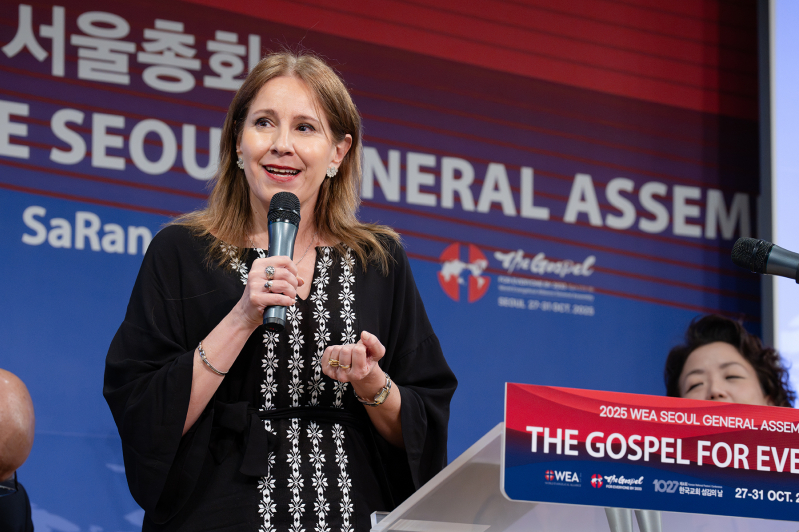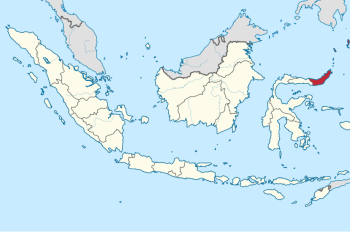
Cinthia Hieber, President and CEO of the Paraguayan Stuttering Association, delivered a deeply personal address at the World Evangelical Alliance (WEA) General Assembly in Seoul on Monday morning, urging churches to embrace radical inclusion and become places of “intentional visibility” for people with disabilities and diverse needs.
Speaking during the second panel of the day, which explored the theme “Living the Gospel in Culture and Cities,” Hieber shared her journey from childhood trauma and despair to finding purpose through faith and advocacy. Her testimony, marked by candor and grace, drew a standing ovation from delegates representing more than 120 nations.
“I am a person who stuttered since I was six years old,” Hieber began, explaining that her speech disorder was triggered when her parents divorced. “It’s a genetic condition, but that event was the trigger.”
By the age of eight, the young Hieber felt hopeless. “I had my first suicide attempt because I didn’t see any future in my life,” she said. “I thought that I would never get married, for example — and I wanted to get married.”
In her youth, she turned her frustration inward, striving for excellence in sports and academics to make her mother proud. “I wanted to compensate for what I thought was my failure,” she recalled. “I wanted her to be proud of me.”
In her teenage years, Hieber became an atheist, convinced that her condition meant God had abandoned her. “Then, when I was 18, I asked God to show me His existence — to prove to me that He was real,” she said. “And He did. That was my turning point. It was the moment I was born again.”
After her conversion, Hieber experienced remarkable improvement in her speech — increasing from 5 percent fluency to about 80 percent within two years. Yet, she admitted, her relationship with God was marked by struggle.
“For 20 years, I fought with God,” she said. “Why didn’t He heal me completely? What difference does it make for the Almighty to go from 80 to 100 percent? I hated my stutter.”
Her perspective changed during a three-and-a-half-year stay in Germany, where she discovered support groups for people who stutter. “It was such a safe place to be,” she said. “When I returned to Paraguay, I searched for a group to join — but there was nothing.”
Years later, while serving on the board of Paraguay’s national alliance, a pastor showed her a heartbreaking letter written by a 12-year-old boy who had taken his own life after enduring bullying for his stutter. “In that moment, God spoke to me,” Hieber said, her voice trembling. “‘You have to create this support group. That’s why I left you with this 20 percent.’”
That encounter birthed a movement. Hieber went on to found Paraguay’s first support group for people who stutter and later established the Paraguayan Stuttering Association, along with a network for parents of children with speech disorders. Today, she also serves on the board of the International Stuttering Association, advocating globally for people with speech and cognitive conditions.
Turning from her testimony to a wider appeal, Hieber challenged churches to follow the example of Christ in reaching those society overlooks. “We as Christians should be as radical as Jesus was,” she said. “He touched and saw those whom nobody wanted to touch or see.”
In cities where people feel invisible, she said, “faith communities must become places of intentional visibility.” Citing Job 29:15–16 — “I was eyes to the blind and feet to the lame; I was a father to the poor” — she asked pointedly, “Do we know in our churches how to treat a person with autism, or someone who is blind, or who has mental health challenges?”
Hieber argued that inclusion should not be accidental but integral to ministry. “We have to understand diverse needs so that inclusion isn’t accidental — it’s built into the DNA of our ministry,” she said. “We have to listen deeply to those with speech differences or cognitive conditions. We have to train leaders and volunteers.”
Hieber recounted a recent training she conducted for pastors in Nairobi, Kenya, where the worship service was led entirely by people with mental and developmental conditions. “It wasn’t the perfect worship,” she said, “but it was like heaven. There were tears everywhere — a haven for them and for their parents.”
That experience, she said, showed what true inclusion looks like. “When we create space for those who are different, we glimpse the Kingdom of God,” she said. “It was like heaven — and a haven.”
Hieber reflected on how God has used her weakness as a channel of His grace. “I have seen how God uses what the world calls weakness to reveal His glory,” she said. “My own story is proof of that.”
She concluded with a challenge to the global Church: “Let us be communities that don’t just include people. We encourage them to live out the calling God has placed on their lives. We have to see them as God sees them.”
Click here for CDI's full reporting from the WEA General Assembly.





